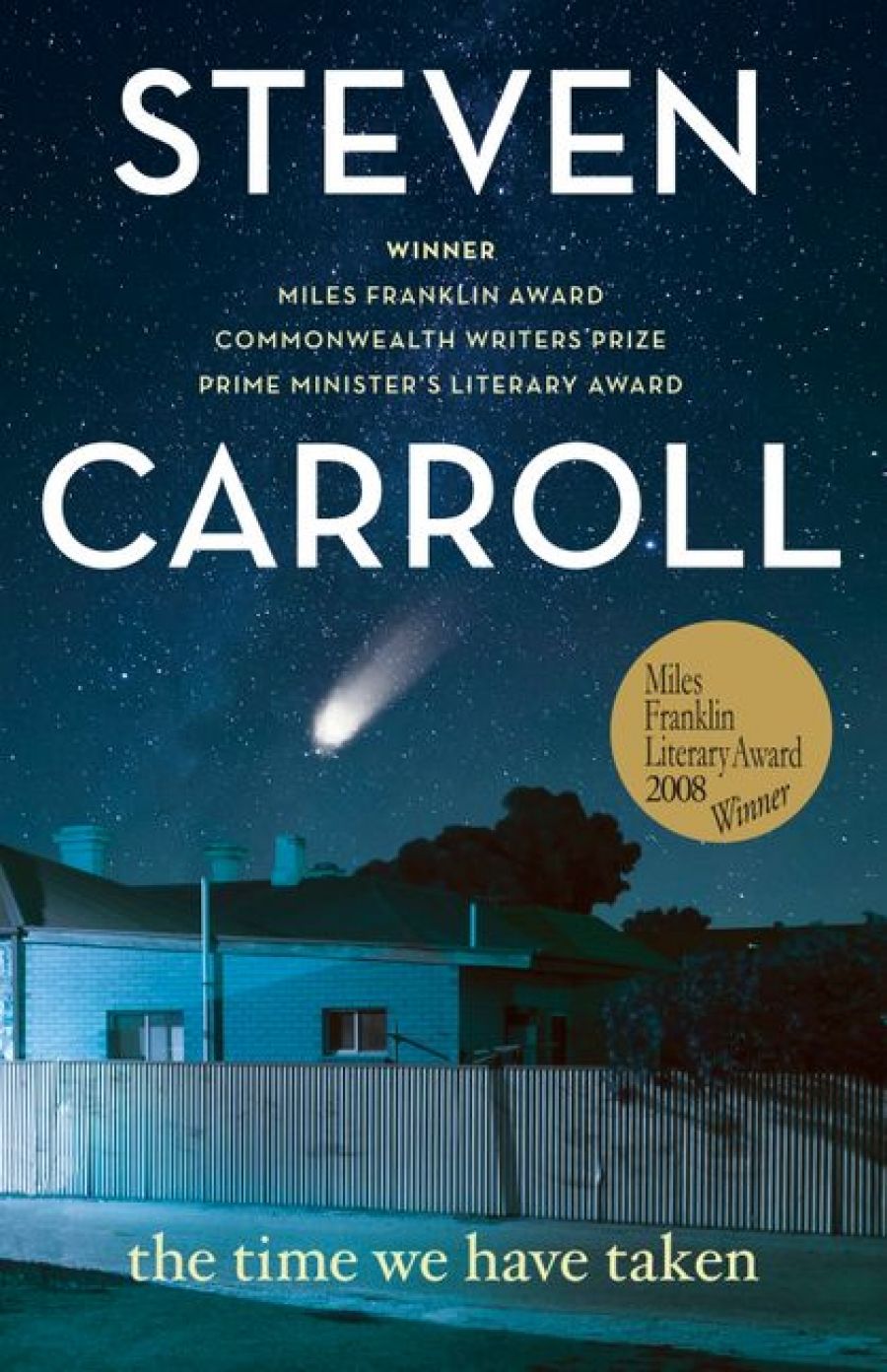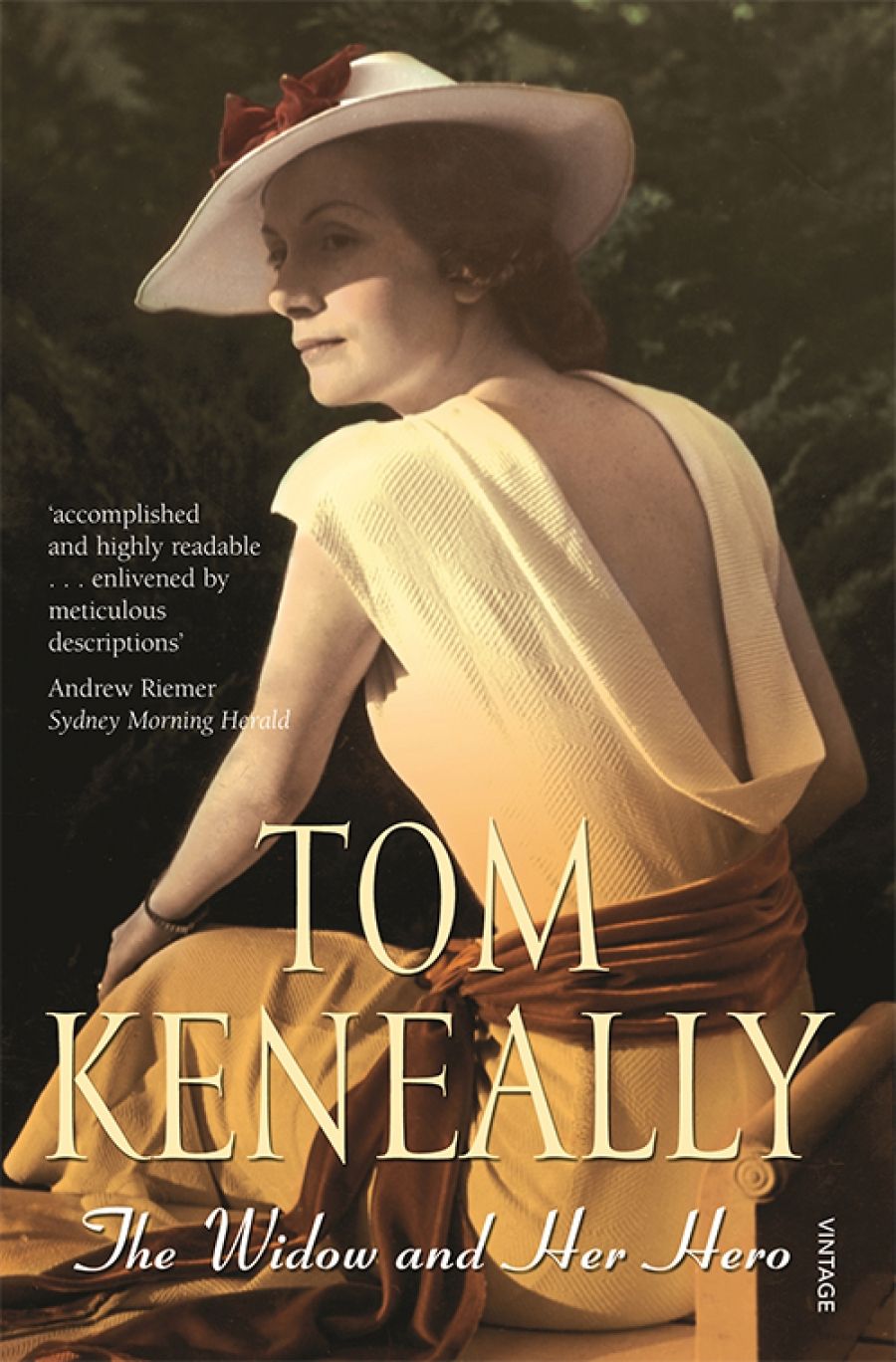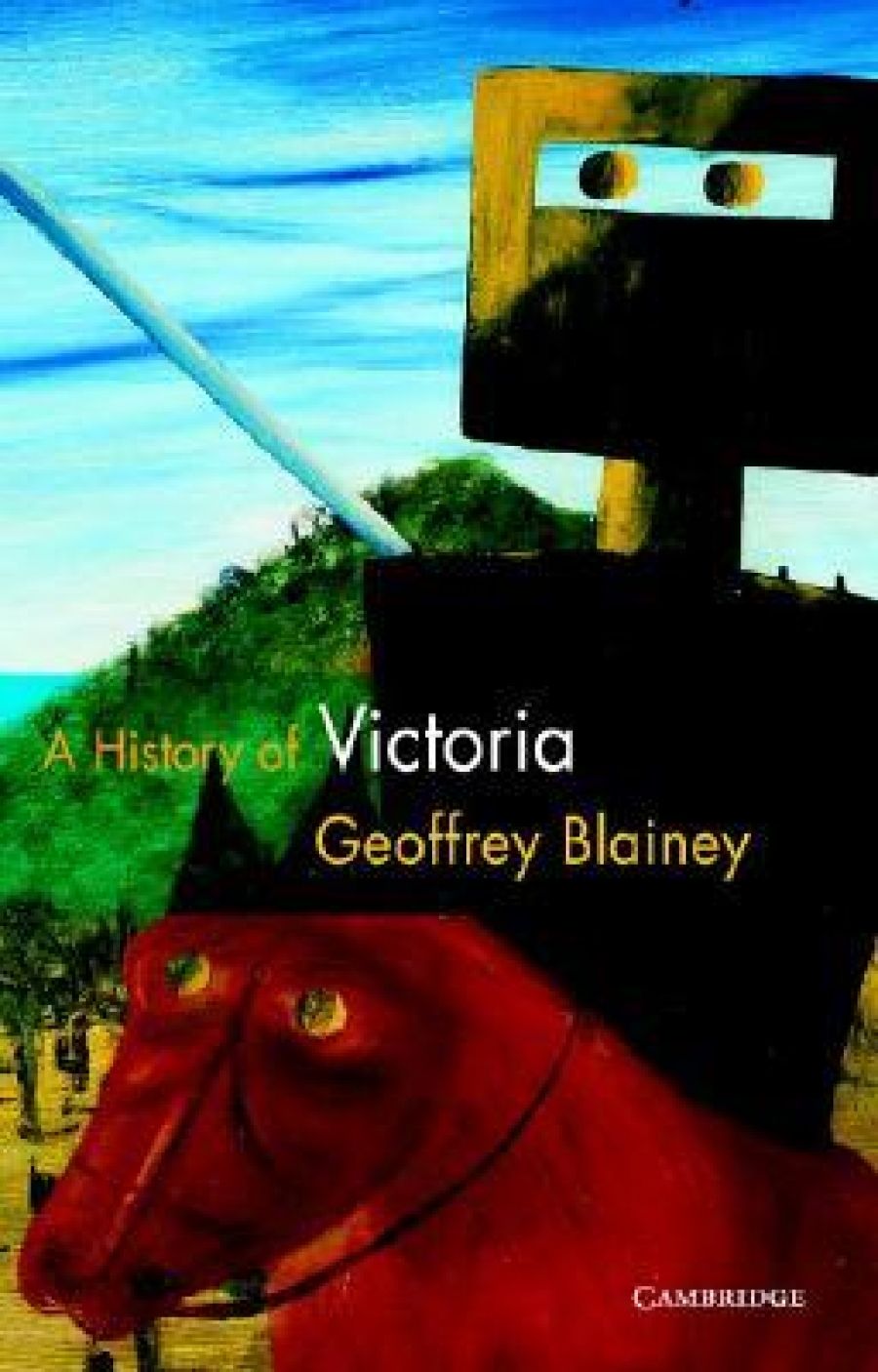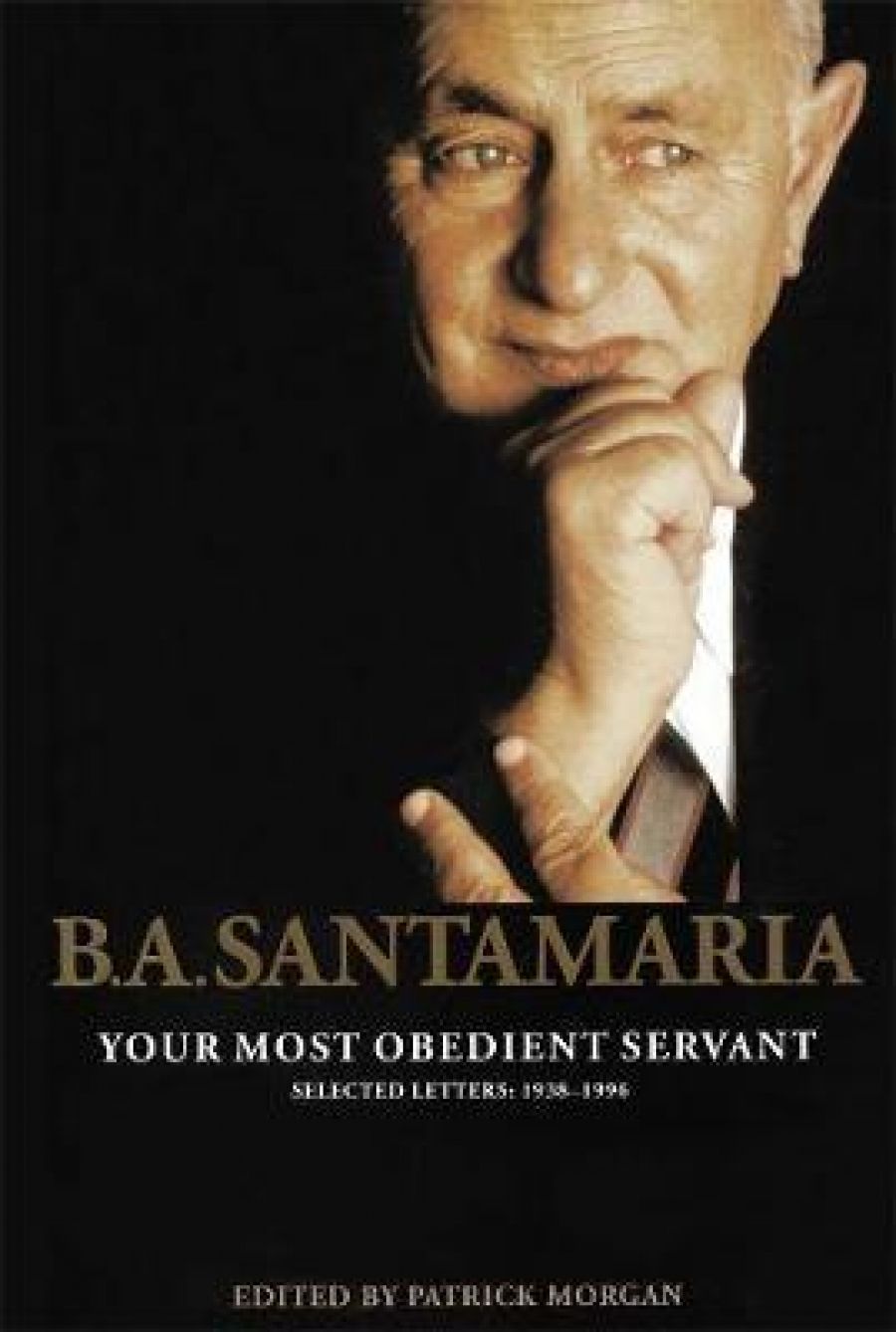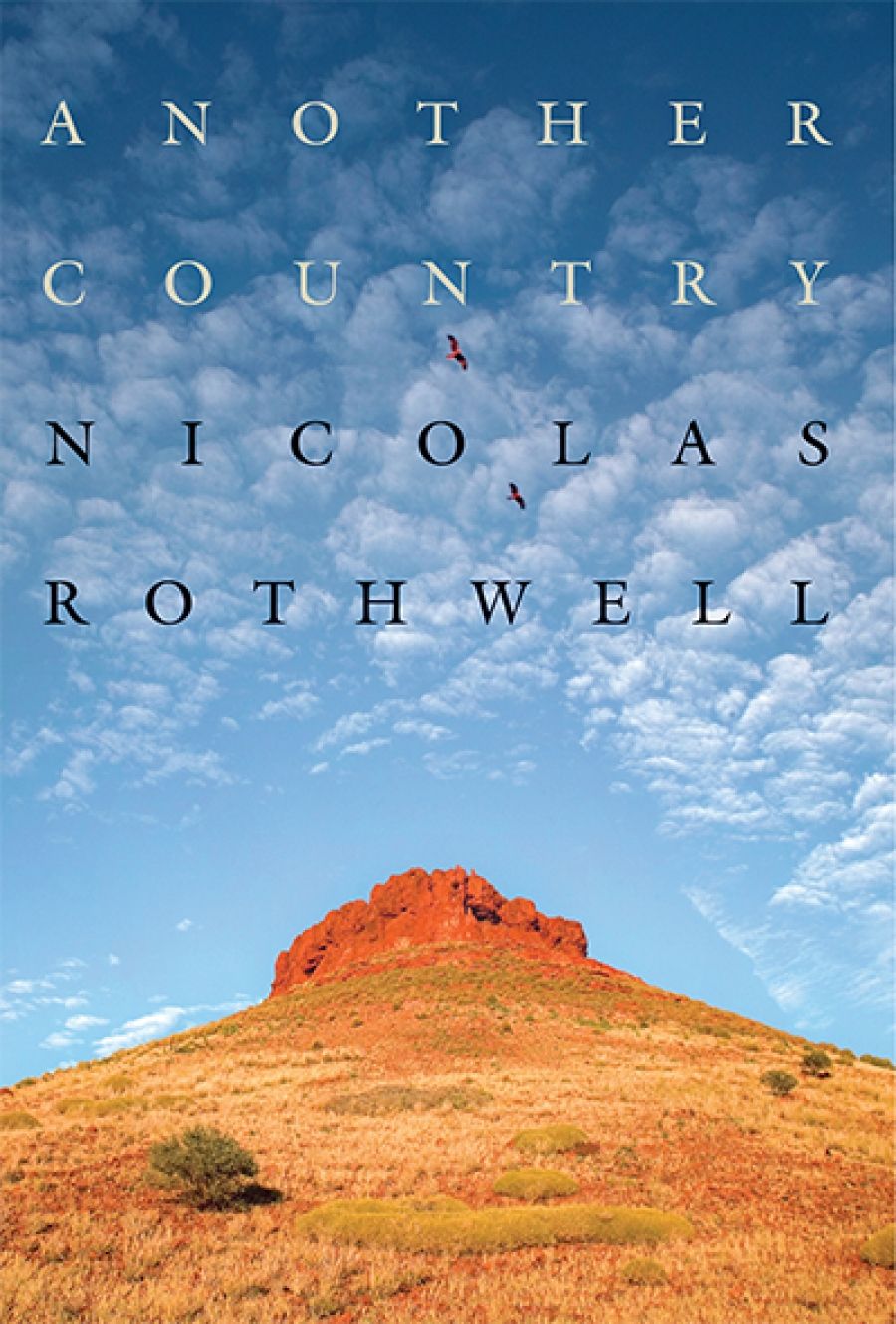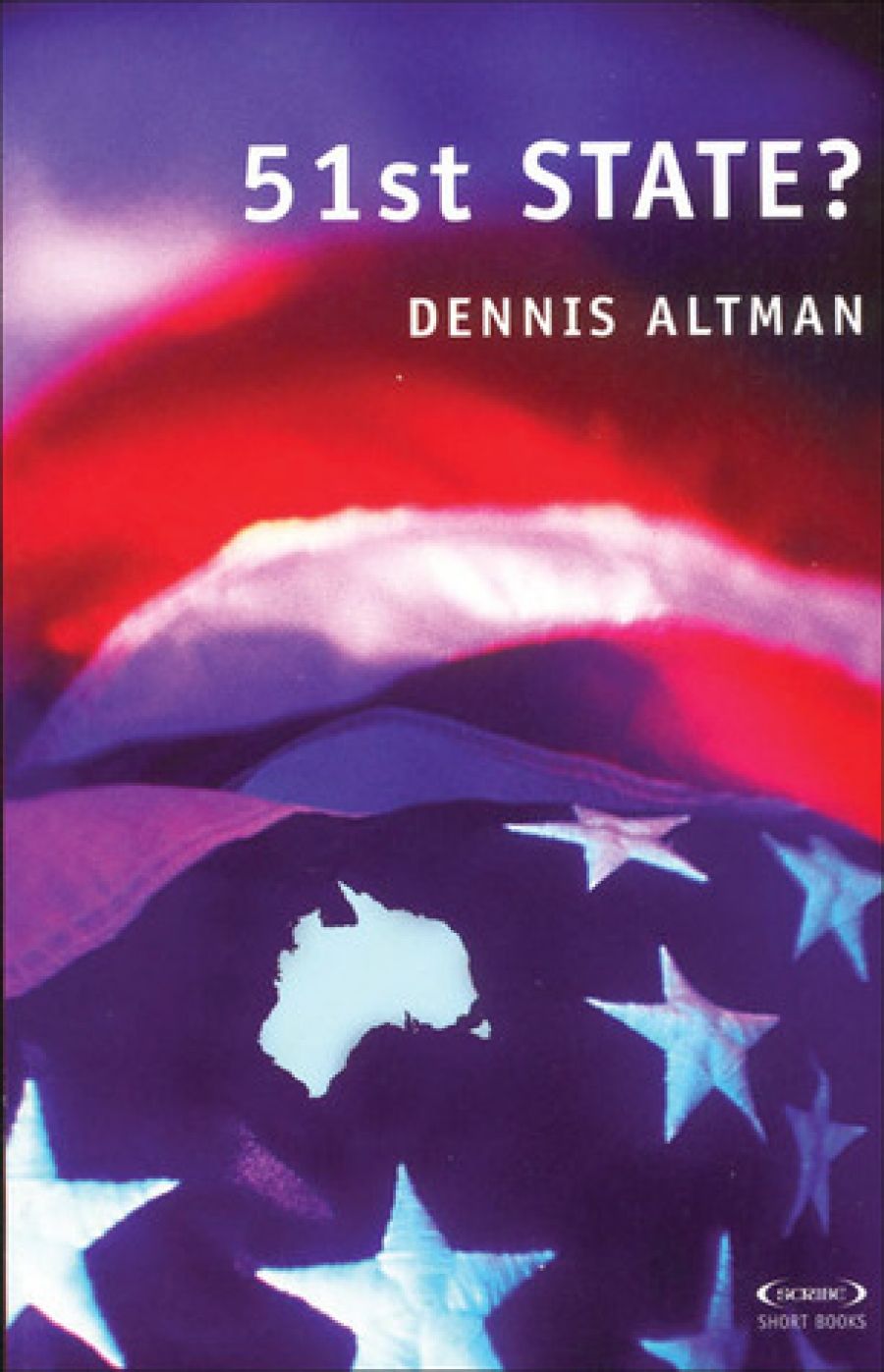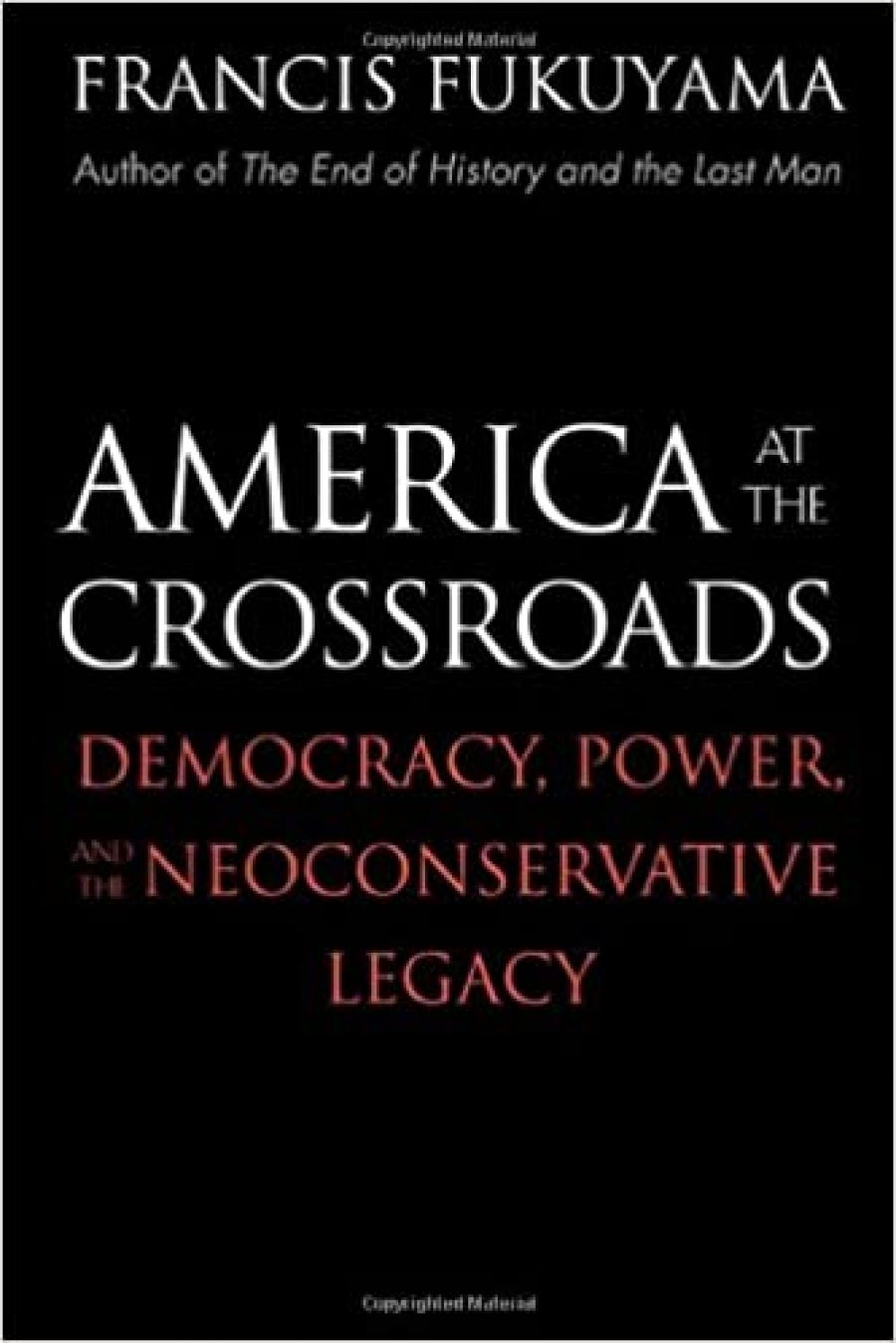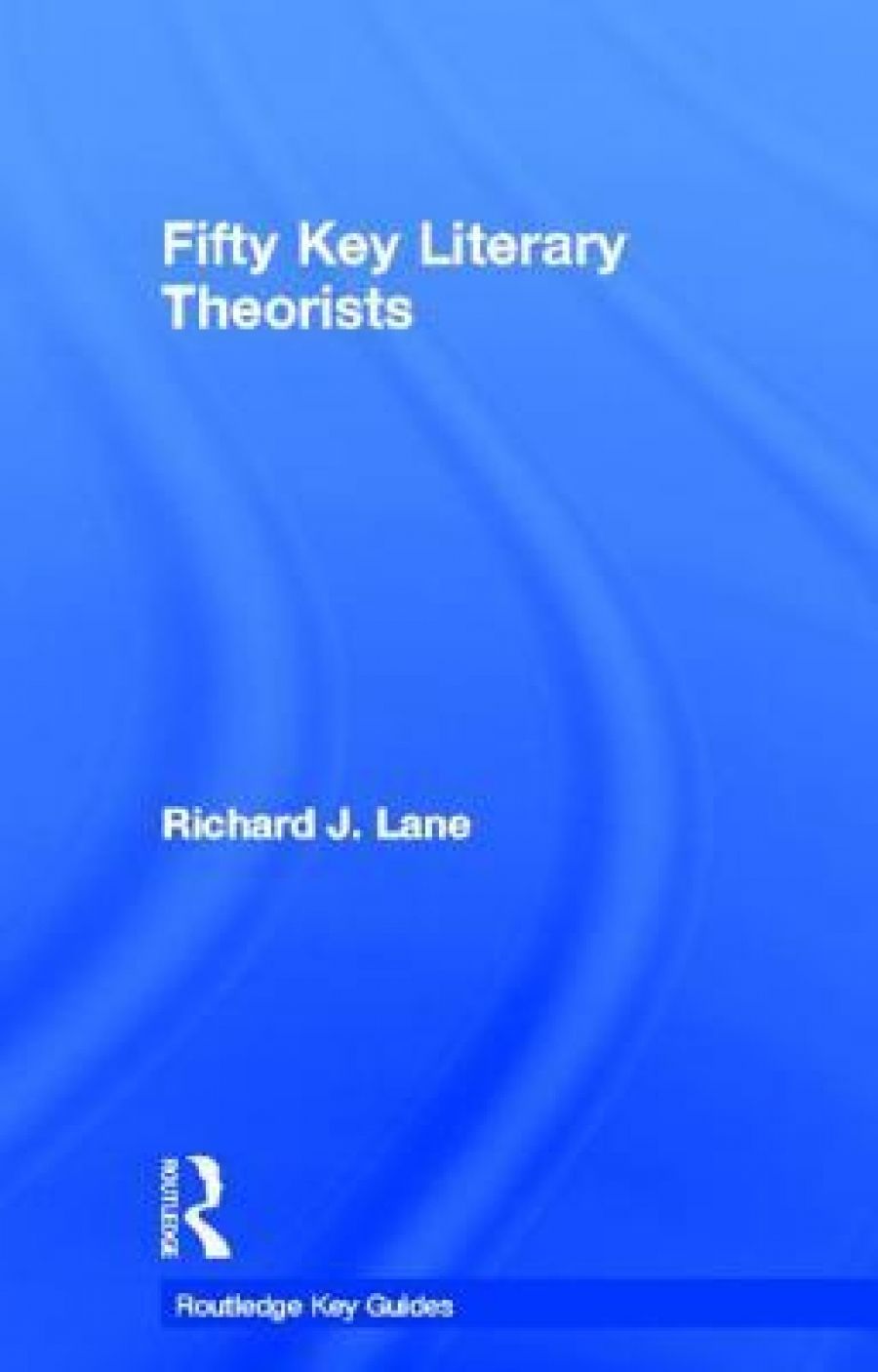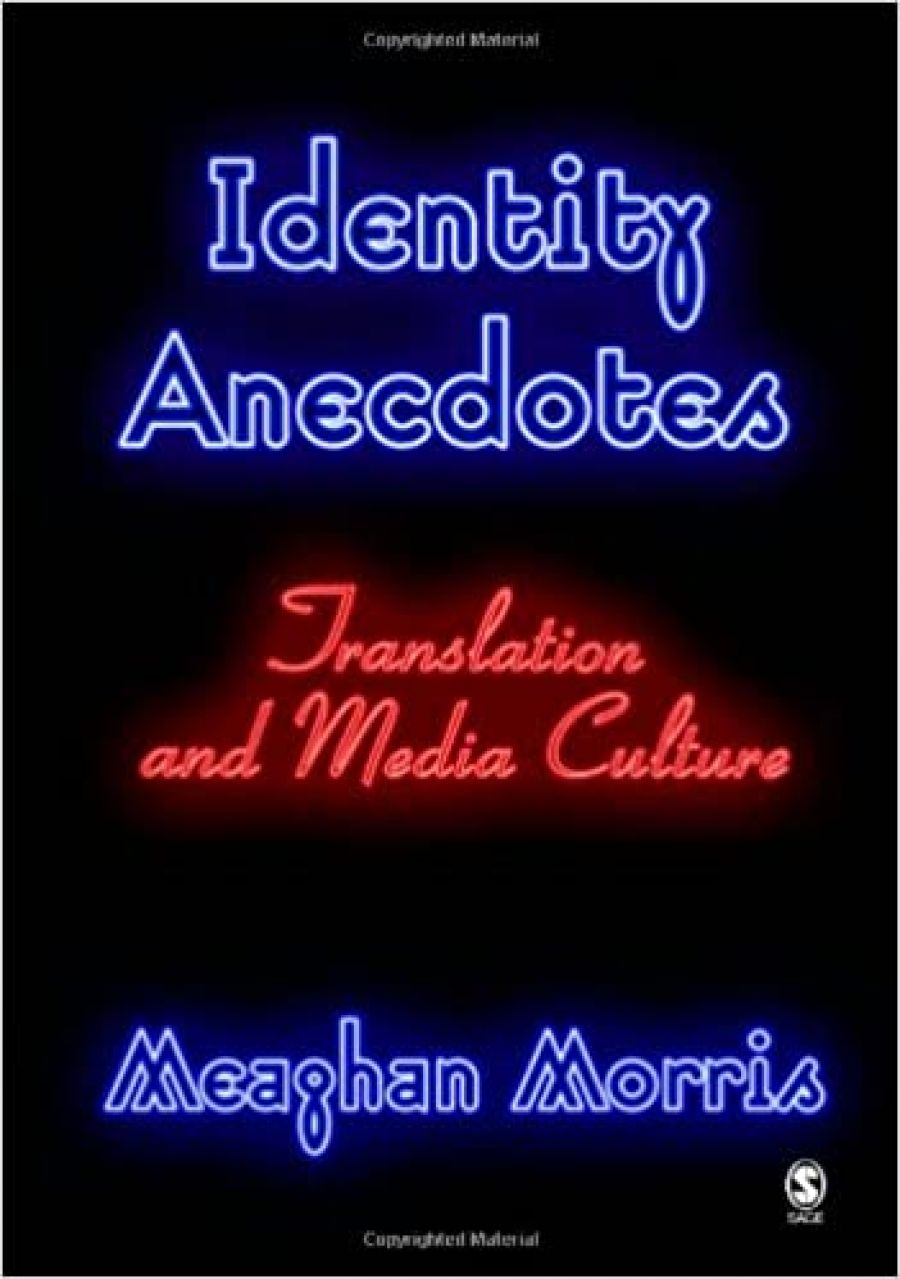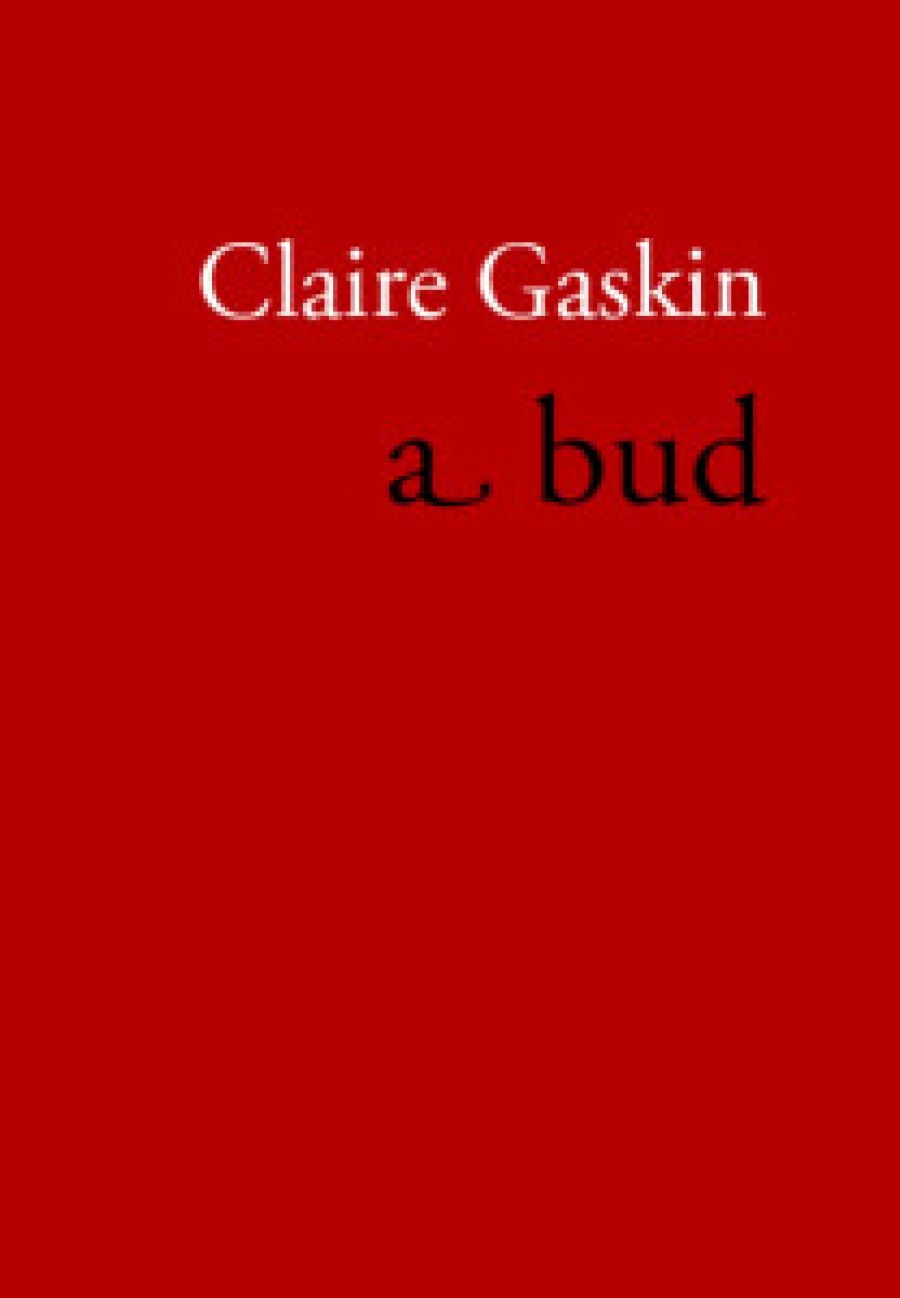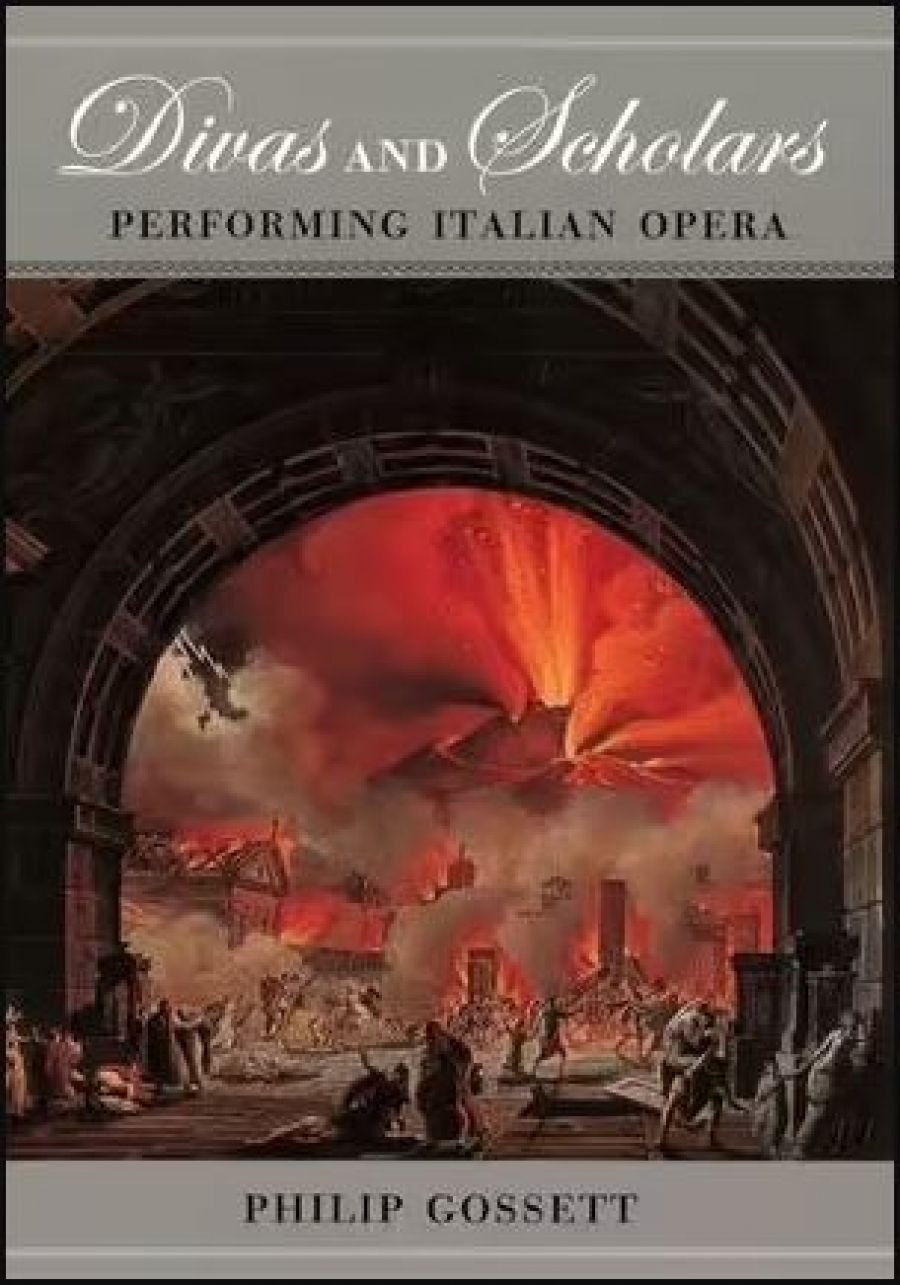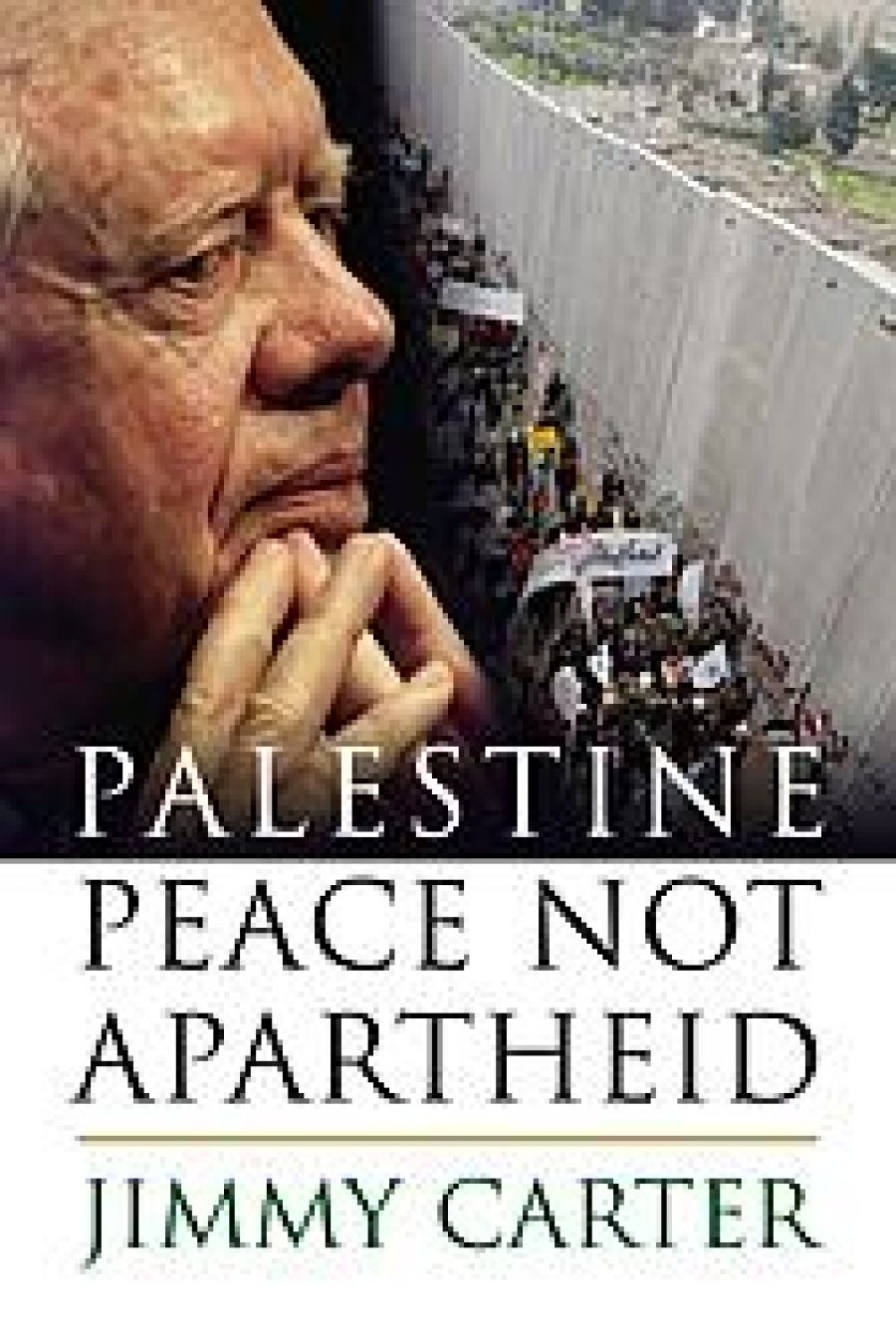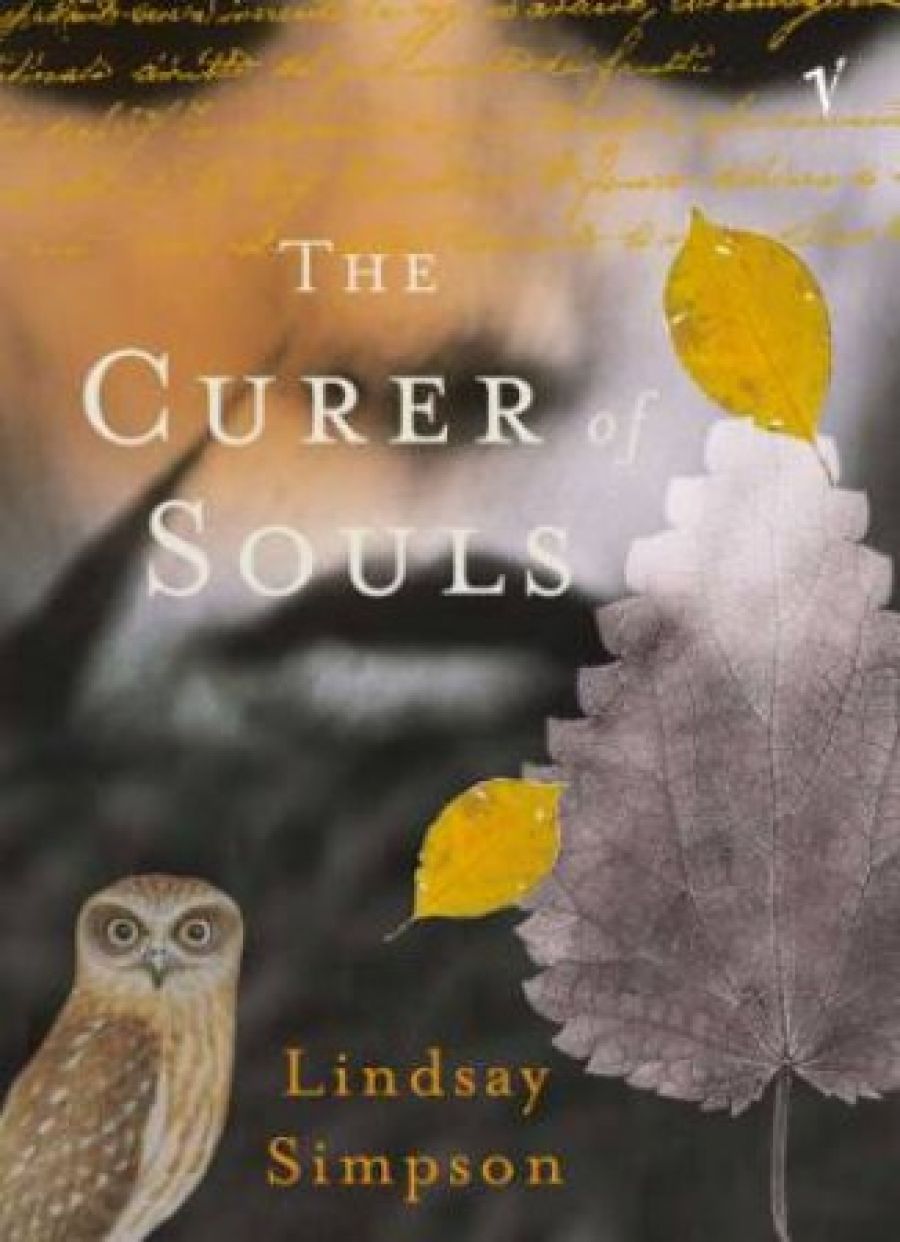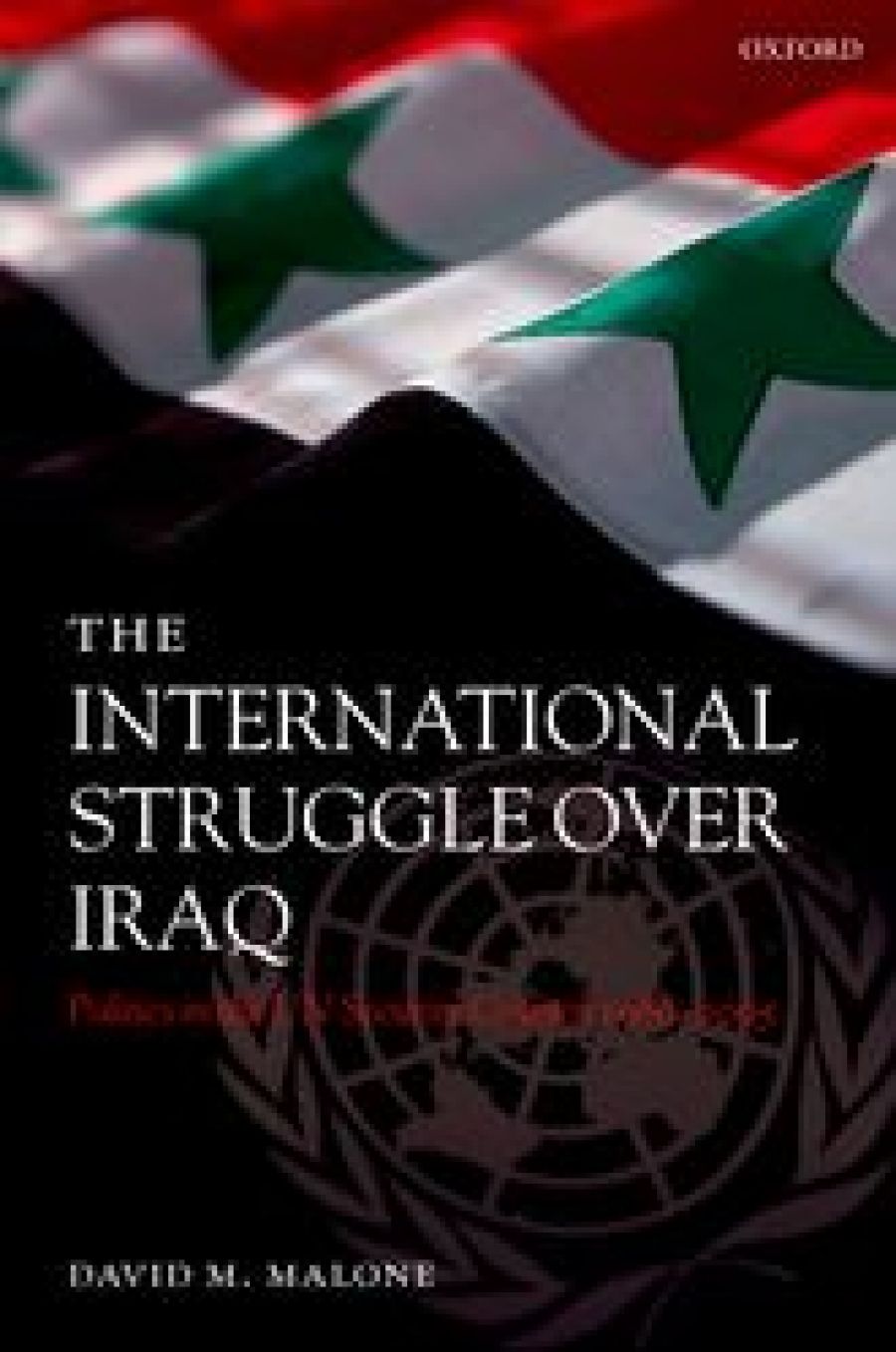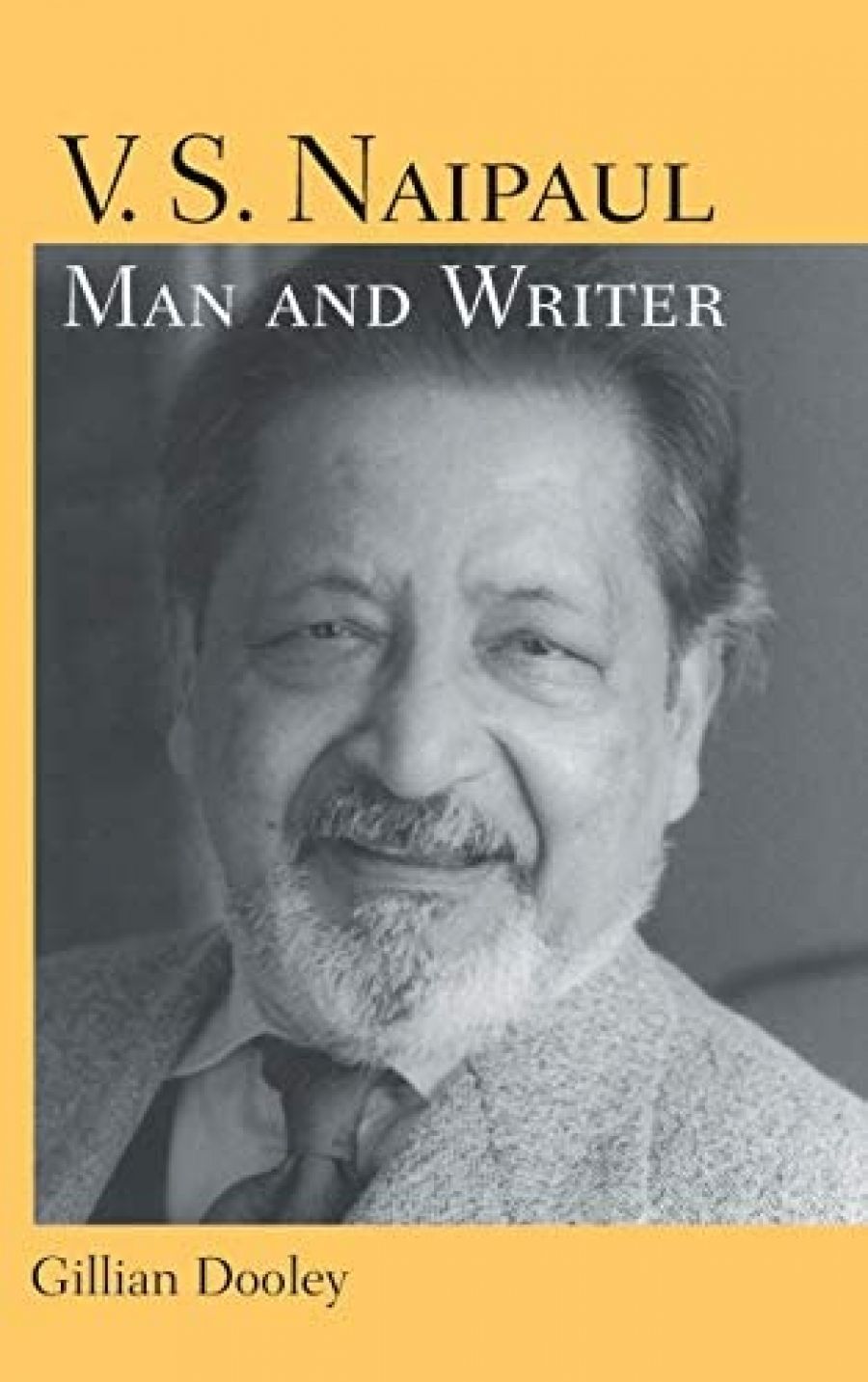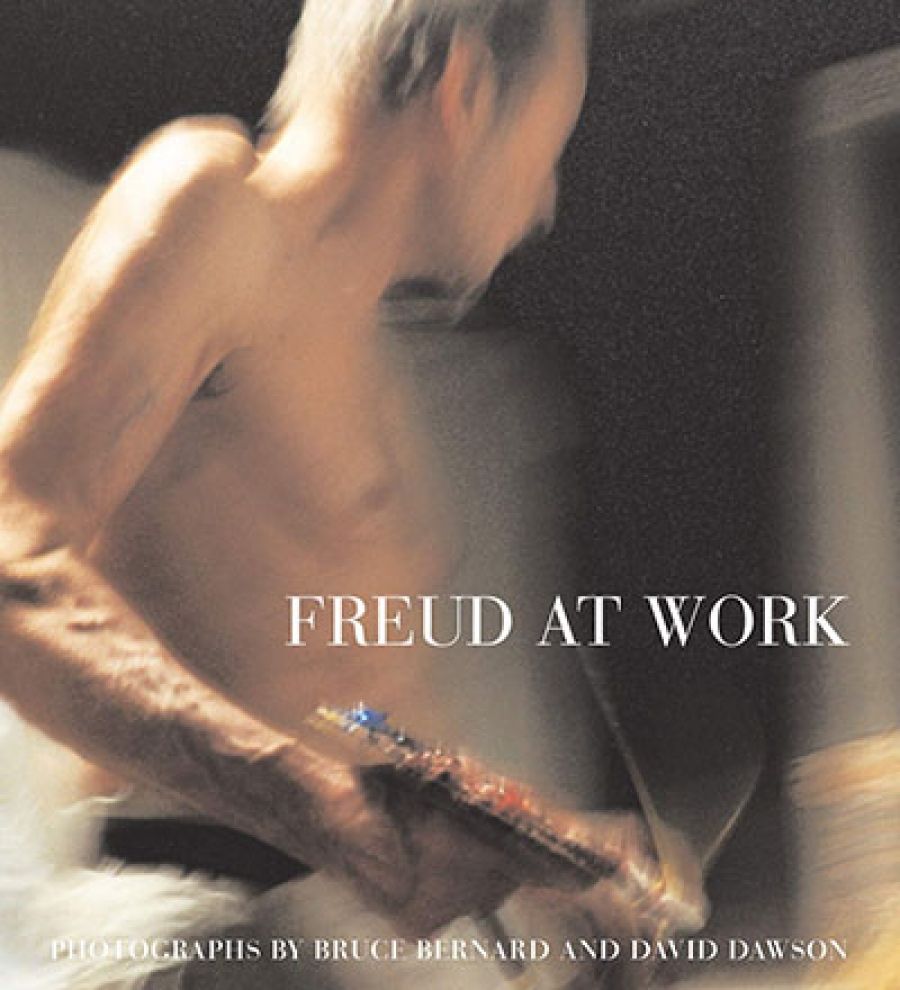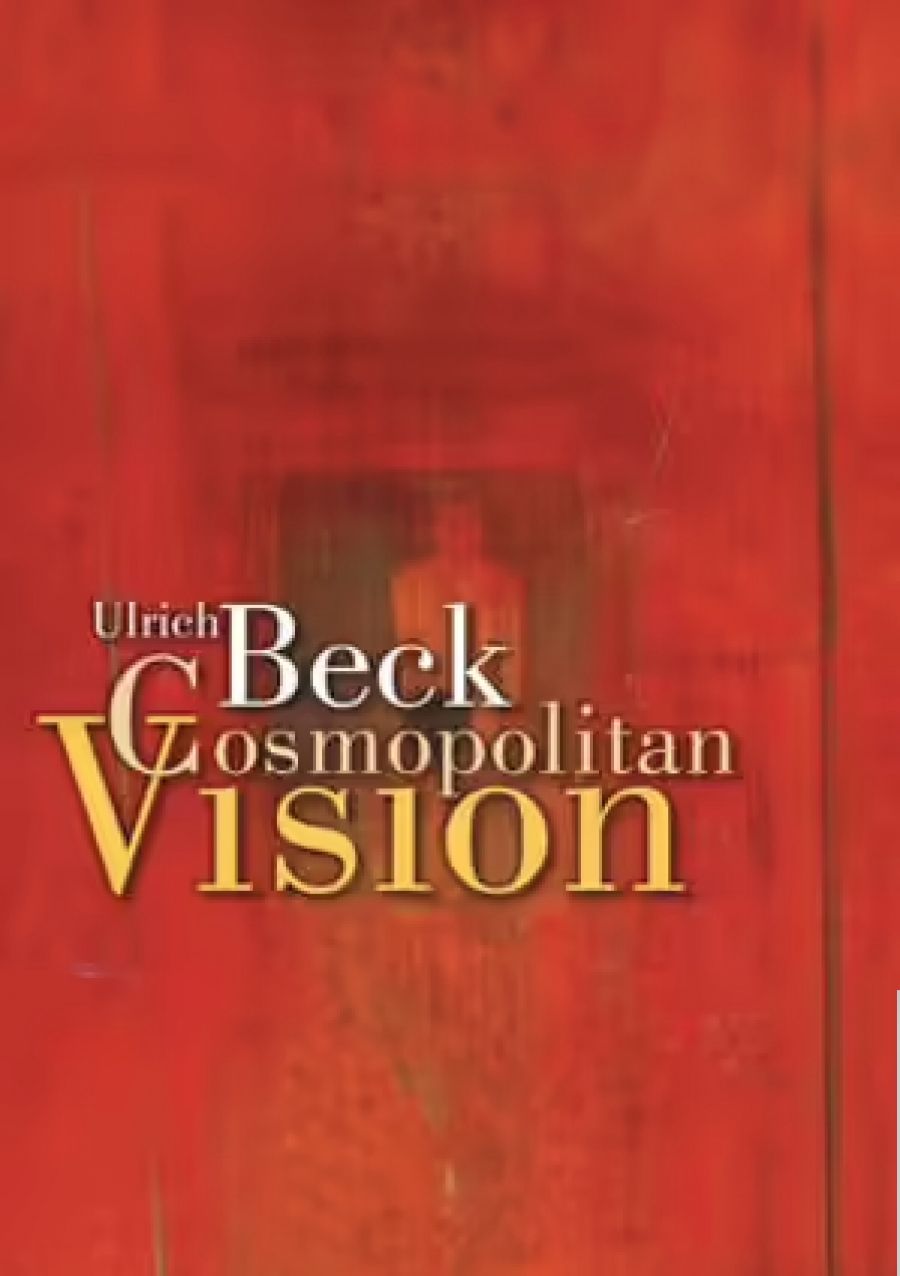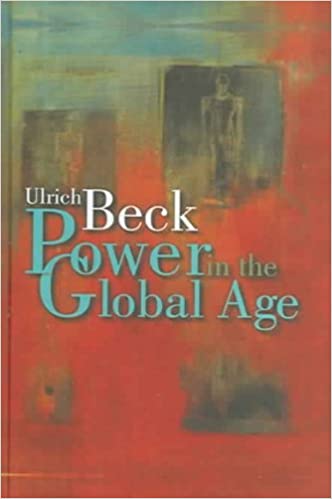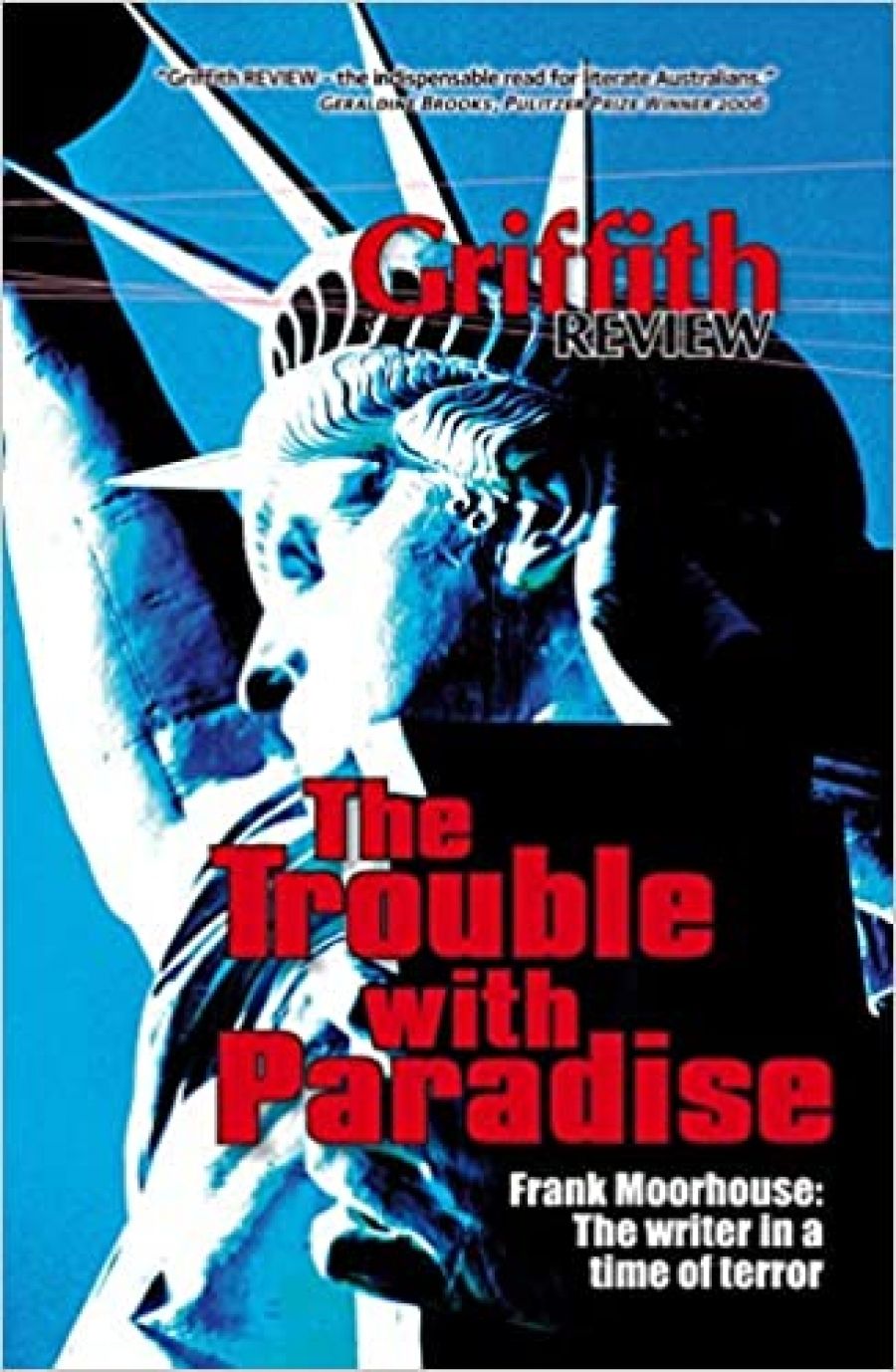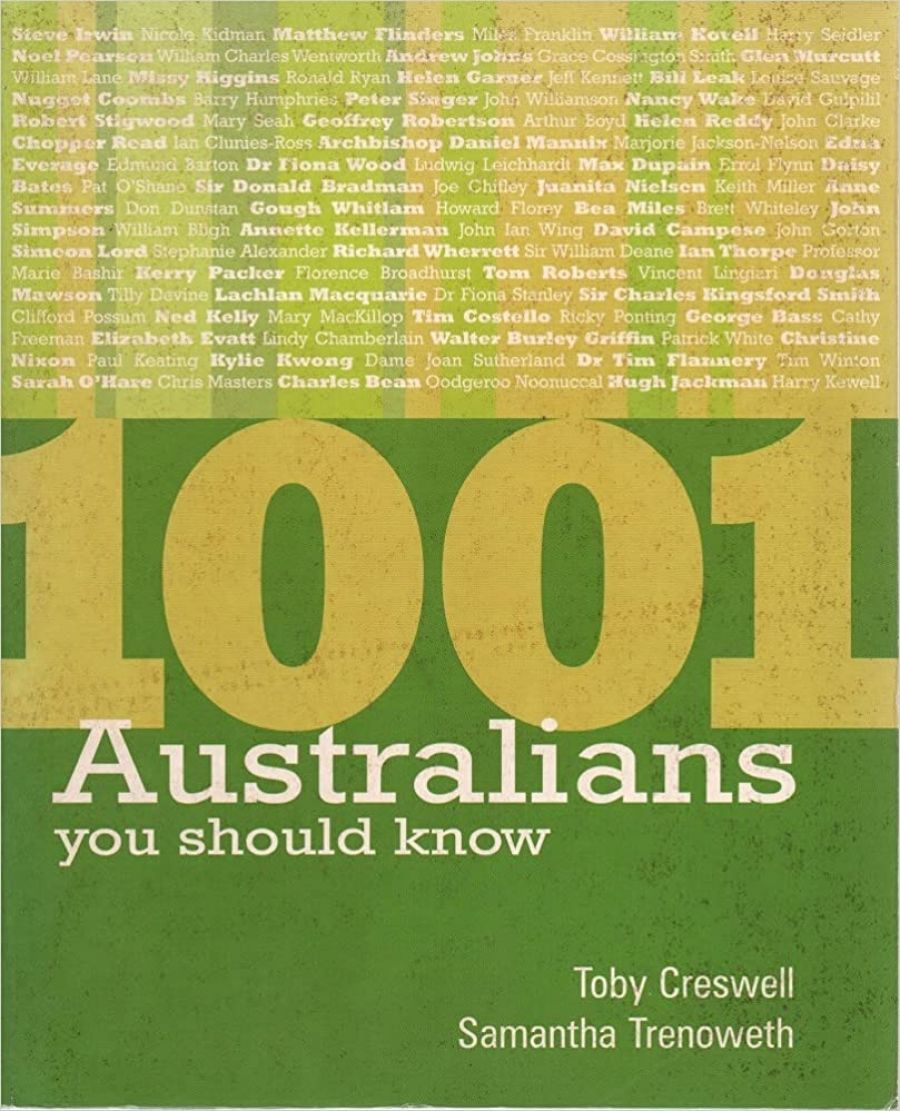Among countless unused fragments of information from my convent schooldays, I remember the correct forms of address for churchmen of all ranks. For the pope, it was Your Holiness; for a cardinal, Your Eminence. Next came Your Grace and My Lord, for archbishops and bishops. Then the cumbersome Right Reverend and Dear Monsignor, followed by Dear Reverend Father, which sufficed for a priest.
Few of us had occasion to use the higher forms. At various stages of his long public life, B.A. Santamaria (1915–98) used them all. He signed his letters to the higher clergy with the same correctness: Your most obedient servant. Those words, which form the subtitle of Patrick Morgan’s substantial selection of letters, have an edge of humour. They point to the paradox of Santamaria’s life and personality. The title acknowledges his unfailing courtesy, and a formality which guarded a very private self. It also prompts the question: to what extent was he ‘an obedient servant’, and to whom?
The Santamaria letters do much to illuminate the ideas and personality of someone who has been demonised and idealised to a degree which obscures his individuality. They record sixty years of ceaseless thinking and striving. There are no family letters, although here and there a reference to his quietly perceptive wife, Helen, and to his eight lively, talented children shows their central importance.
These letters begin in 1938, with the young Santamaria starting work in Catholic Action, and move swiftly on to the anti-communist trade union ‘Movement’ of the early 1940s, the ALP split in 1954–55, and Santamaria’s sudden notoriety as the presumed architect of the ALP’s defeat in the federal election of 1954.
Reading the early letters has been a disconcerting experience for me. They take me back to my twenty-three-year-old self, and to the evening early in 1954 when I first met Bob and Helen Santamaria at the home of Melbourne University law lecturer Frank Maher and his wife Molly, whose wit and warmth made the Maher ‘evenings’ one of the pleasures of Kew, our shared neighborhood. Maher had preceded Santamaria as director of Catholic Action in Australia, and they remained close friends. Over the teacups that evening, Santamaria asked me what I was doing. Nothing much, I had to admit; nothing at all, really. After an unhappy finals year in arts at Melbourne University, shadowed by my father’s illness and by his death a few days after my graduation, I had given up plans to go to Oxford. Subsequently, I dropped my MA thesis at Melbourne, having written nothing. Our family structure fell apart, with four more deaths in less than two years. Lacking guidance and motivation, barely coping with the sequence of bereavements, I knew I had to do something, but opportunities for young women in the early 1950s were limited.
After a few minutes’ talk in casual and friendly style, Santamaria offered me a job. As director of the National Catholic Rural Movement, he published a monthly journal, Rural Life. Would I like to be its editor? The offer was as impulsive as my acceptance. Looking back, I find comic irony in my one reservation. I thought that Catholic Action – in effect, working for the Australian bishops – might be dull. Yet Santamaria had an engaging joie de vivre, and I liked his wife’s quiet charm. The idea of being an editor was appealing, so I thought I would give it a try.
My new job included research assistance for the annual Social Justice Statements, which Santamaria wrote on behalf of the bishops. In these and other writings, long before the Whitlam government adopted multiculturalism, with Al Grassby its eloquent spokesman, Santamaria was advocating ‘cultural pluralism’ and the beginnings of Asian immigration, which must have been a hard sell for some of his Rural Movement members.
I enjoyed learning the elements of journalism for Rural Life, and began to find my way round the office, which was unexpectedly complicated. Almost wholly ignorant of politics and trade unionism, I had never heard of the ‘Movement’, which Santamaria directed alongside his official Catholic Action work. Thus, in October 1954, when the ALP leader Dr Evatt launched his famous attack on a ‘disloyal element’ in his party, I was almost as surprised as Evatt was pretending to be. Having grown up in Studley Park Road, Kew, with Archbishop Mannix, John Wren and Robert Menzies as neighbours, I should have had some awareness of political and religious power. But it was all very polite and peaceful in Studley Park, and I never encountered sectarian feeling until the Evatt–Santamaria crisis blew up. My reaction then was a new sense of tribal loyalty: to Mannix, the indomitable old man who was a familiar figure from my childhood; and to Santamaria, whose courage and serenity under pressure I admired, especially when the sectarian attacks took on an unpleasantly racist tone, exemplified in a pamphlet ‘The Black Hand of Santamaria’.
If I had known more, I would never have wandered into the maelstrom of the Labor Split. Not because I would have thought the Movement wrong or mistaken: I would then have assumed that the Australian bishops knew what they were doing. But by nature I avoided conflict, took a cautious ‘yes, but ...’ position on most things, and had no political interests. No one asked me to join anything, so I didn’t know there was anything to join. As I later learned, there was secrecy at the edges, but it was part of the paradox of Santamaria that his central office was open and informal, with no security at all.
For many years, I was too embarrassed to admit my naïveté. More than half a century on, I see it as a 1950s woman’s story, and by no means unique to a Catholic institution. The office meetings, chaired by Santamaria, were only for the men. There were separate lunch rooms, and no communal morning or afternoon teas. The divide between the men who made policies and the women who typed and carried tea trays was absolute. In my quiet corner – writing about decentralisation, rural communes, irrigation, migration, venturing an opinion on country kitchens, tidying up reports of country branch meetings, marking copy for the printer – it was a long way from the gathering political storms of the time.
Now, as I read the Santamaria letters, I can see that the Evatt attack was not really unexpected. The Movement was set up in response to the anxieties of certain ALP men who sought Catholic help in organising an opposition vote against communist trade union candidates. The Catholic bishops, afraid of sectarian attacks, wanted their financial and moral support to be kept secret.
A series of letters shows Santamaria’s attempts to revise the bishops’ thinking on secrecy. Surprisingly, in view of their close friendship, it was Mannix who blocked Santamaria’s last attempt, in May 1954, to separate Catholic Action from the Movement. ‘I want to get out,’ Santamaria wrote. ‘I disagreed with [Mannix] more violently than I have ever had the guts to disagree with him in the past.’ There is high comedy in the account of a meeting of the Australian bishops, which closed with their admonition to ‘act prudently’ and ‘not to bring the names of the chiefs [bishops] into the picture’. It was already too late. Meanwhile, from quite another quarter, Santamaria was warned that ‘Bert [Evatt] might jump for a bandwagon’.
The special interest of Patrick Morgan’s splendid edition of Santamaria’s letters, and of his balanced, informative commentary, is that for the first time we hear Santamaria’s voice in a variety of modes and moods. The solemn, urgent, peremptory note is there, but so is his mischievous humour at the expense of some bishops whose obedient servant he continued to sign himself. His rueful acceptance of failure (‘I was a bit of a fool not to watch my rear’) goes with an extraordinary resilience.
The first letter, boyishly awkward, is a reminder that when Santamaria was singled out by Mannix for his post in Catholic Action he was only twenty-two. Leaving Mannix’s house, Raheen, in 1938, he was ‘jumping for joy’ at the prospect ahead. In 1944, aged twenty-nine, he was lecturing Arthur Calwell as if he and the seasoned political leader were on equal terms: ‘Well, Arthur, those are our principles.’ In later letters, especially those to Eric D’Arcy (later archbishop) and to poet James McAuley, his warmth shows through. The last letter movingly accepts the ending of life and work ‘as the shades of night close in’.
Santamaria’s causes did not begin, nor end, with the anti-communist organisation of the 1940s and 1950s. He had close contacts with the Liberal Party leaders, Menzies, R.G. Casey, and Malcolm Fraser among others, and towards the end of his life was amused and pleased to find himself in accord on globalisation and big business economics with old adversaries such as Phillip Adams and Clyde Cameron, from whom he had friendly letters.
The Split brought huge damage, personal and political. But it is simplistic to see Santamaria as the single-handed wrecker. Other factors included a long history of sectarianism in Australia and the frantic ambition of an increasingly unstable Dr Evatt. ALP supporters who rightly mourned their fragmented party, and chafed at the extension of the Menzies years, might not have been so happy with a dementing Evatt as prime minister, nor with Arthur Calwell, his presumed successor, a rigid believer in a White Australia. As immigration minister in the 1940s, Calwell had excluded and deported the Asian spouses of Australian citizens in a series of inhumane decisions which have their deplorable echoes in today’s government policy.
Santamaria’s liberal immigration policy, challenging ALP orthodoxy, may have contributed to Calwell’s recalcitrance in 1956, when there was a chance of reuniting the party. Most likely, the personal and the political were intertwined. Calwell, a traditional Irish-Australian Catholic, treasured his friendship with Mannix. Long before the Split, he would have resented Santamaria’s ascendancy. Poignantly, when Mannix was dying, the seemingly rejected older son, Calwell, came to his bedside, as did Santamaria, the chosen heir to a fast-vanishing kingdom.
Within the Catholic Church, the ALP Split brought bitterness and division. Families were divided, friendships lost. Political directions from certain priests were a throwback to nineteenth-century Ireland. In Melbourne, Bishop Fox tried to direct the Catholic vote from the pulpit, while Mannix, more subtly, used his immense personal authority. The mutual dislike between Mannix and Sydney’s Cardinal Gilroy increased the tensions.
Could any good come of this clerical infighting? Eventually, I think it did, though the main players would not have seen it that way. Gilroy defeated Mannix, Santamaria and the Movement by a direct appeal for loyalty and obedience from his flock. As historian Patrick O’Farrell has said, Gilroy’s victory marked the last, crude, anachronistic exercise of political authority by the Irish clerical church in Australia. As a tactic, it could never be used again. A crucial, though unintended, benefit was the end of a unified and deliverable Catholic vote.
Santamaria was probably better off without his fractious conclaves of bishops. With the 1957 decision from the Vatican that formally ended the Movement, he reinvented his organisation as the National Civic Council. He created his own spheres of influence in public affairs, through his writing, his broadcasting and his wide-ranging personal contacts, national and international. Yet his relative independence had a cost. As Morgan remarks, distance could mean inflexibility. This was true of Santamaria’s view of the Australian universities, which was badly skewed. His thinking on the women’s movement was perfunctory: he was so sure he was right. Spending too much time with like-minded people, he tended to stereotype his adversaries – though never returning the rancour with which he had been treated.
One aspect of his life, which fits perfectly with my memory of him, is what Morgan describes as his ‘extensive private welfare bureau’. People in trouble, bewildered migrants, the homeless and unemployed, the lonely and the obsessed, were given an attentive hearing and practical help from his extraordinary network. As Morgan discovered in perusing the Santamaria papers, ‘the scope of this activity was staggering and genuinely altruistic’.
My final task for Santamaria was a series of interviews with Archbishop Mannix, then in his nineties, for a biography that Santamaria would later write. When I think of my 1950s self at Raheen, with my little notebook, asking halting questions about an 1860s Irish childhood, I am not surprised that I failed. Mannix, a veteran of thousands of interviews, was perfectly willing to tell me things I already knew from published sources, but he wasn’t interested in revisiting his past. It was time for me to pick up my academic career again, learn independence, discover the world for myself. The Mannix biography was probably the deciding factor. Santamaria was too close to his much-revered subject; and even my cautious leaning towards psychobiography would have horrified him. The intuitive response to people which made him a thoughtful host and a generous friend went with a deep mistrust of introspection.
Why did such a talented man, a brilliant organiser, a charismatic personality, choose to express his ideas through others, nearly all of them his intellectual inferiors? One factor may be his early experience in Depression Melbourne, as the exceptionally gifted eldest son of a Brunswick greengrocer. Quickly surpassing his Italian migrant parents in education and worldly knowledge, he must have been the leader at home from an early age. An Italian in an Irish-Australian Christian Brothers’ school, he never quite belonged. He was only fifteen when he won a university scholarship, a year too young to start his course. Such precocious success might bring confidence in the power of the self. But in the small, privileged, class-conscious world of Melbourne University in the 1930s, a working-class Italian Catholic was an outsider on three counts.
Having graduated in arts and law, Santamaria was almost ready for legal practice when Archbishop Mannix’s job offer gave him immediate authority. Within the Movement and the NCC, he never had an intellectual equal to challenge him, though there were rumblings of discontent and huffy departures from time to time. Thus he lacked real companionship, based on equality, in his working life. He dealt with patrons and protégés: he directed, explained, persuaded. His charmingly diffident manner disguised the fact that he was always in charge.
After I had left his office and was happily absorbed in my academic career at Monash, I told Santamaria that I couldn’t give any more help with his Mannix biography, as he had hoped I might. He said: ‘Oh, well, the university apostolate is important too.’ Then, seeing my look of dismay, he added quickly: ‘But of course, you’re not an activist.’ He accepted my unspoken declaration of independence and we remained friends. That moment marked my sudden, sharp awareness that I never wanted to express any ideas but my own, never to represent anyone but myself. Within the university, as one of a close-knit group of friends and colleagues, I was at home as I had never been before.
Being part of a community of equals, men and women, was an experience denied to Santamaria. He created his own structures; and when one failed, he built another. For all his charm and social ease, was Santamaria fated always to be on the outside, never taking a place in any group? With his happy family life, many friends and an overflowing measure of admiration from his supporters, one could hardly say that he was deprived in human terms. Yet he had no successors of comparable ability, and the institutions he created have fractured and dwindled in influence.
Perhaps the final paradox, which the letters reveal, is the vein of pessimism which co-existed with strong religious faith and a seemingly limitless capacity for hope. Much of Santamaria’s work failed, and he knew it – even expected it. Yet he never stopped trying. Patrick Morgan’s selection, in its variety of mood, period and occasion, opens the way to a better understanding of a complex man whom history has greatly oversimplified.


